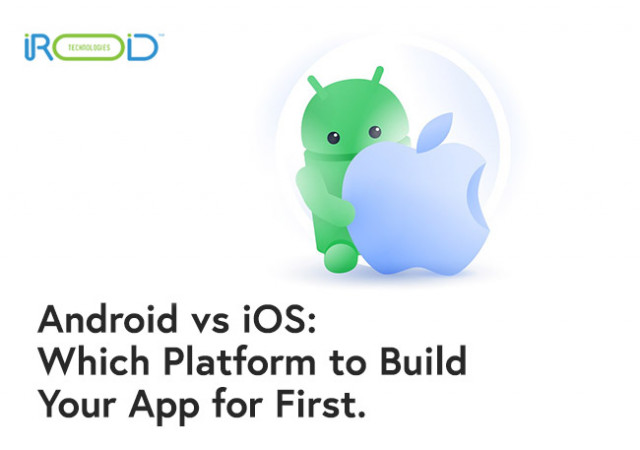Android vs iOS: Which will you choose First

iOS:
Apple Incorporation offers the iOS mobile operating system. It is primarily made for Apple's smartphones, including the iPhone and iPod Touch. It was once referred to as iPhone OS. It is an operating system based on Darwin's (BSD) operating system that resembles Unix. After Android, it is the second-most popular mobile operating system worldwide. It is mostly written in Swift, Objective-C, C++, and assembly code. In 2007, the first iteration of iOS was released.
Android:
Google LLC offers the mobile operating system known as Android. It is built using an altered Linux kernel and other open-source programs. For touchscreen mobile devices like smartphones and tablets, it is specially made. Languages including C, Java, C++, and others were used in its development. Google released the initial iteration of Android in 2008. Android 10 is the newest stable version of the operating system. It is offered completely free of charge making it the top choice of Android app developers in India. In general, it is the most widely used operating system.
If you’re developing an app, producing for iOS or Android is one of the first choices you need to make. While your intention may be to launch on both platforms ultimately, it is dangerous and costly to build an app for both iOS and Android together. Instead, most developers wish to build an app for one platform to begin and then start the app on the other platform later – once the first account of the app is established and victorious. How do you determine whether to launch your app on the Android or iOS front? There are pros and cons to both platforms, but finally, the choice appears down to 5 circumstances:
Depends on Your Audience
There are fundamental differences in the users' Android and iOS interests. For instance, Android devices have the most sweeping global market share. However, Apple controls the App Store for customer spending. Suppose your target audience’s geographic and demographic aspects when deciding which platform to develop for the beginning. If you’re targeting a wider global audience, Android may be your most solid bet. If your audience is in Western Europe or North America, or if you’re an e-commerce or business app, Apple may be a more suitable option.
Timeline Required for Making an App
It’s quicker, simpler, and more affordable to develop for iOS – some measures put development time at 30-40% longer for Android. One judgment why iOS is more relaxed to develop is the code. Android apps are usually written in Java, a language that requires writing more code than Swift, Apple’s standard programming language. Another cause is that Android is an open-source programming language. A lack of regularity means more accessories, parts, and software fragmentation to account for. Apple’s exclusive ecosystem means you’re growing for a few patterned devices and operating systems. That said, the Apple App Store has more stringent rules and class expectations and a more extended review process, so it may take higher for apps to be supported. Your app may also be refused if it’s not up to Apple’s norms.
Flexibility With Features
What characteristics will you offer within your custom app? Because Android is open-source, there's more versatility to customize your app-building the peculiarities and functions that your audience requires. Of course, this open environment indicates Android is more sensitive to pirate apps and malware. Apple is generally understood as being more stable, due to its closed environment, which is principally why iOS has a larger audience in the business market.
Maintaining the App
Developing for Android may mean killing more time ensuring that your app remains harmonious with the platform and avoiding defects and falls for users running older operating systems. Android users are more hesitant to adopt new operating systems. One research found over 50% of Android users were operating an operating system more than 2 ages old. Apple users are more inclined to modernize their operating systems.
Monetizing Your App
If app monetization is one of your intentions, there are some pivotal platform differences to be conscious of. Android users serve to be less agreeable to pay for apps than iOS users, so free apps with in-app ads are more popular. The Apple App Store produces twice as much income as Google Play, despite having partial as many downloads. If you want to monetize your app without ads, whether by subscriptions, freemium models, or in-app purchases, then Apple may be your most valid chance. The same pertains to e-commerce apps. However, income from Android apps is increasing. Though Apple is presumed to remain the dominant App Store, Google Play and third-party Android stores connected are supposed to overtake the App Store in phases of revenue.
Android vs Apple
Where your audience lives, who they imply, the objects they want, and your development timeline and resources are some factors that determine whether you should build a custom app for Android or iOS leading. If you need to create a minimum viable product quickly and inexpensively, then iOS may be the way to go. Furthermore, if you want to make bread with your app or develop an e-commerce app, look to iOS.
However, if you’re targeting global or developing markets, particularly in Asia and Latin America, or if your app requires features that Apple doesn’t support, then Android is your most backed venture. Whichever platform you pick, once you’ve worked out the difficulties and built a user base on your original platform, you may find that users on the other platform begin clamoring for a variant of your app. When this happens, it’s a symbol that it’s time to build a different version of your app for the other platform. Need help getting Android app developers in India or iOS app developers in India? Get in touch with us and we can help you get an app as per your requisite.

